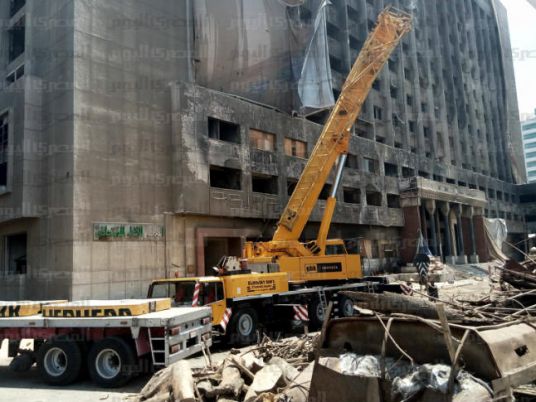
Metres from the epicentre of Egypt's uprising, bulldozers tear chunks of concrete and twisted metal from what remains of the headquarters of ousted strongman Hosni Mubarak's now disbanded party.
During the heady days of the 2011 revolution, protesters set fire to the National Democratic Party (NDP) building, seen as a symbol of decades of corruption and police abuse, next to Cairo's iconic Tahrir Square.
But four years later, hopes of a new era of democracy have been replaced by warnings that Egypt is beginning an even more repressive chapter under President Abdel Fattah al-Sisi.
Human Rights Watch has condemned "gross violations" of human rights in Egypt and the "almost total impunity" enjoyed by security forces under Sisi, the former army chief who deposed Mubarak's successor, Mohamed Morsi, in 2013.
Disillusionment has also set in among the Egyptians who took to the streets of Cairo as the pro-democracy protests that came to be known as the "Arab Spring" swept across the region.
"Nothing has changed," said government employee Hani Shetaea.
"We rebelled for bread, freedom and social justice. But the situation has only worsened," added the 42-year-old, who was at Tahrir Square the night when the NDP building was set ablaze.
Since the ouster of Morsi — Egypt's first freely elected president — more than 1,400 people, mostly Morsi supporters, have been killed in a police crackdown overseen by Sisi.
Another 40,000 have been detained, according to New York-based HRW.
– 'Changing history' –
The demolition of the NDP building began last month after the government gave its go ahead.
The move shows a desire to "change history", said Ahmed Abd Rabou, political professor at Cairo University, who is also pessimistic about Egypt's future.
"Despite his flaws, we could negotiate with Mubarak," he said.
"But the current regime is threatening opponents, has strengthened the role of the military and security apparatus, and politicised the judiciary. It's worse than Mubarak."
Since Morsi's overthrow, the judiciary has acquitted or handed light prison terms to several officials from the Mubarak regime.
Murder charges against the 87-year-old former strongman himself were dropped last November over the deaths of some 800 protesters during the uprising.
Egypt's Court of Cassation this month overturned that decision and ordered Mubarak to stand trial for a third time over the protester deaths. He remains in detention in a military hospital in Cairo.
Of the dozens of police officers tried for the killings of the protesters, most have been acquitted.
– 'Police state at its peak' –
Inside the NDP building compound, amid the charred remains of several cars, an old party poster proclaims: "The contribution of our youth is good for our country."
The NDP enjoyed a majority in parliament during Mubarak's presidency and triumphed in elections that were marred by complaints of fraud.
The party was officially dissolved by a court order in 2011 but a separate ruling last July lifted a ban barring its members from contesting elections.
The main opposition movements have been suppressed since Morsi's ouster.
His Muslim Brotherhood, which scored major electoral gains in 2011 and 2012, has been designated a "terrorist group," while the April 6 youth movement that spearheaded the anti-Mubarak revolt has been banned.
"Today, Egypt does not even have a political front as under Mubarak," said Amr Ali, a coordinator of April 6.
"There are no opposition parties or even a parliament."
Dozens of secular and leftist activists have been jailed for breaking a controversial law that forbids all but police-sanctioned protests.
"There is no big difference between Sisi and Mubarak. Businessmen are back, media is cheering for Sisi and the police state is at its peak," said Gamal Eid, director of the Arab Network for Human Rights.
"We are witnessing the worst repression experienced by Egypt in decades," said Eid, who was jailed four times under Mubarak.
Passing by the partially demolished Mubarak party headquarters, Shetaea also feared difficult days lie ahead.
"I see the NDP building being demolished every day, but I am also witnessing a worse regime being built every day," he said in a hushed tone.
